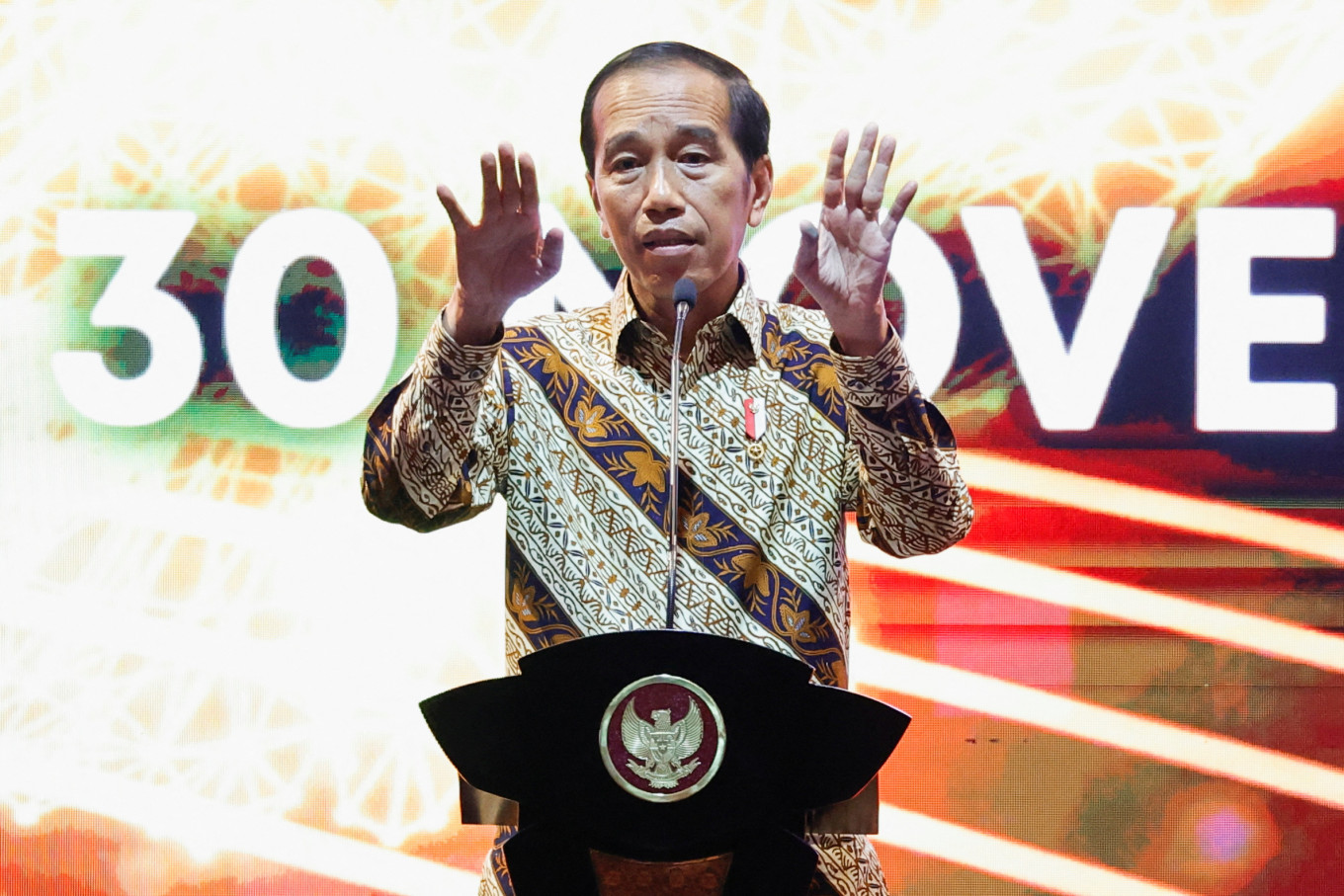Popular Reads
Top Results
Can't find what you're looking for?
View all search resultsPopular Reads
Top Results
Can't find what you're looking for?
View all search resultsEconomy headed into uncharted waters in 2023
RI braces for continuing global uncertainty.
Change text size
Gift Premium Articles
to Anyone
B
oth the government and businesses expect difficult economic conditions in 2023, mainly as a result of the geopolitical tensions caused by the war in Ukraine, which will continue to create uncertainty.
In a forum held by the Coordinating Economic Ministry revolving around next year’s economic outlook, President Joko “Jokowi” Widodo acknowledged that the country was bracing for a situation that was “not easy”, “hard to predict” and “hard to measure”.
He underlined that traditional economic policies were no longer sufficient to deal with current global economic turmoil, as inflation around the world remained high, followed by subsequent high interest rates.
“Everything that has happened has not been in accordance with the set of knowledge that we possess,” President Jokowi told forum participants on Wednesday.
Speaking at the same event, Finance Minister Sri Mulyani highlighted that several factors had contributed to the persisting issues on the supply and demand sides, which are both crucial aspects to the growth of Indonesian enterprises.
On the supply side, the minister explained that economic sanction blowouts between Russia and the Western allies had disrupted the global supply of key commodities, causing oil, gas and food prices to rise above historical levels.
On the demand side, meanwhile, there had been a slight opportunity for recovery as the global pandemic threat had begun to dissipate while labor markets remained “unpredictable”, thus creating a “tight labor” situation in developed countries.
According to the International Monetary Fund, labor tightness is a situation in which huge job opportunities are opened but the talent pool is not sufficient to fill the gap, which leads to upward pressure on wages and thus inflation.
“We cannot know the geopolitical settlement of negotiations between Russia, Europe and Ukraine,” the minister said, stressing that “it creates uncertainty which, by its nature, cannot to be predicted in [normal] economic terms.”
Due to stubborn inflation in the developed countries, the finance chief explained that their monetary authorities were left with the only option to raise interest rates and tighten liquidity to an “extreme” degree.
Such policies would cause an economic slowdown for these countries, she said, while Indonesia’s challenge in 2023 would be “keeping an eye on the global environment,” in particular the war-induced slowdown in Europe and the Chinese struggle to open its economy alongside increasing cases of COVID-19.
She expects export growth to “normalize” next year, due to the high baseline this year and economic erosion of Indonesia’s major markets, a situation that incentivizes the government to look into nontraditional markets such as India and the Middle East as alternative export destinations.
Investment, meanwhile, will be affected by rising interest rates, which will determine investors’ appetite for risk. The government, nonetheless, will still do everything to spur investment growth by at least beyond 6 percent in 2023.
Read also: RI trade performance cools amid continuing surplus
Financial Services Authority (OJK) chairperson Mahendra Siregar said it would continue monitoring the restructuring schemes in sectors that are still battered by the pandemic, including micro, small and medium enterprises (MSMEs) and tourism.
As for labor-intensive industries, such as textiles and footwear, he said that the OJK was considering extending the restructuring program for one more year, as these industries were affected by sluggish demand in the global market.
“The financial sector, as the lifeblood of the economy, should also be directed to strengthening national priorities,” Mahendra said.
Businesses projection
In a separate event on Wednesday, Indonesia Employers Association (Apindo) chairperson Hariyadi Sukamdani projected that layoffs would continue in 2023 as there had not been any signs of a rebound by export-oriented industries, such as textiles and furniture.
He said that according to Workers Social Security Agency (BPJS Ketenagakerjaan) data, almost 920,000 workers had been laid off from January to November this year.
Against such conditions, businesses believe that next year’s investment will be focused on capital-intensive projects, while labor-intensive projects will see a reduction in capital injection.
“Investment will continue [to grow], but in terms of employment, it is still a problem for all of us,” Hariyadi told reporters.
He also complained about government policies, such as import duties, that restrict imports of raw materials for the manufacturing of value-added goods, thus hampering the growth of several sectors.
Read also: RI’s restrictive trade hurts manufacturing: World Bank
Regarding another challenge for next year, former finance minister under then-president Susilo Bambang Yudhoyono, Chatib Basri, said that the United States was on the track to bring its own economy into recession to curb inflation.
Due to the mismatch between supply and demand in the labor market, Chatib said that the US would enter a recession as unemployment will likely rise from the current 3.7 percent to as high as 10 percent in the span of a year, a situation that will lead to aggressive rate hikes by the Federal Reserve.
If these policies are in line, the US could see inflation beginning to drop by the end of 2023, Chatib said, which means Bank Indonesia would have to raise its benchmark rates to close the gap.
As monetary policy remains focused on stability, it will be prudent for the fiscal authorities to bolster consumers’ purchasing power.
“When I was a kid, my mom used to tell me that being frugal meant being rich. But in the face of this crisis, spending will mean recovery,” Chatib said.










